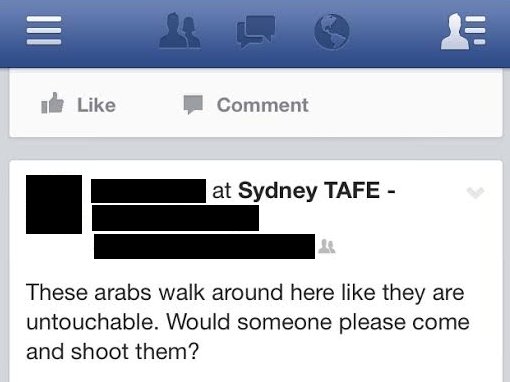Most of the online hate OHPI reports on is public content. The reason for this is that public content is able to go viral and can usually do far more harm than content shared between people privately or only between friends. It is because of the greater risk from public content that OHPI usually focuses on content like Facebook pages (where all the content is public), rather than Facebook groups (where content is often visible only to the members of the group). Taking something private slides the balance between freedom of speech and freedom from hate more firmly towards the side of free speech. This is recognised in the law as well, for example, section 18C of the Racial Discrimination Act which makes it unlawful to “offend, insult, humiliate or intimidate another person or a group of people” on the basis of their race does not apply to private conduct. This said, some types of content are never protected by freedom of speech principles.
Private messages design to threaten, intimidate or harass an individual do not deserve the protection of free speech. They are a common form of cyber-bullying and in extreme cases are designed to drive individuals to self harm and suicide. In Australia, sending such messages through the internet, even privately, may be a criminal offence under s 474.17 of the Commonwealth Criminal Code. This section makes “using a carriage service to menace, harass or cause offence” a crime punishable by up to 3 years in prison. The full section reads:
74.17 Using a carriage service to menace, harass or cause offence
(1) A person is guilty of an offence if:
(a) the person uses a carriage service; and
(b) the person does so in a way (whether by the method of use or the content of a communication, or both) that reasonable persons would regard as being, in all the circumstances, menacing, harassing or offensive.
In some cases a person will be actively encourage to commit suicide. When this occurs an offence will be committed under Section 474.29A of the Commonwealth Criminal Code.
Some online platforms allow content to be shared with a limited group of people, rather than with the public. Facebook, for example, allows posts to be shared only with friends. Posts to friends may not be intended to “menace, harass or cause offence” to ones friends, but can still be unlawful in other ways. The post above, for example, might breach s 11.4 which prohibits incitement to commit and offence. The post below might be considered incitement to commit murder. Such content should be reported not only to the social media platform, but also to police – even when the content is shared only with friends.
There’s a thin line between online posts advocating violence and a breakdown of society leading to violence on the streets. The idea that anyone is a “legitimate target” for violence because of their race is an extreme form of racism. Such views have no place in Australian society, or indeed in any other civilised society in 2014. If you see posts like this, speak up.

